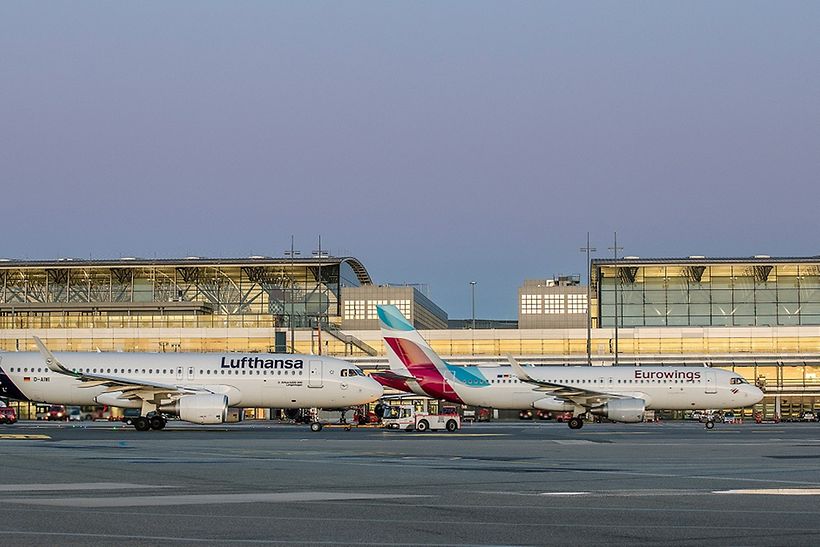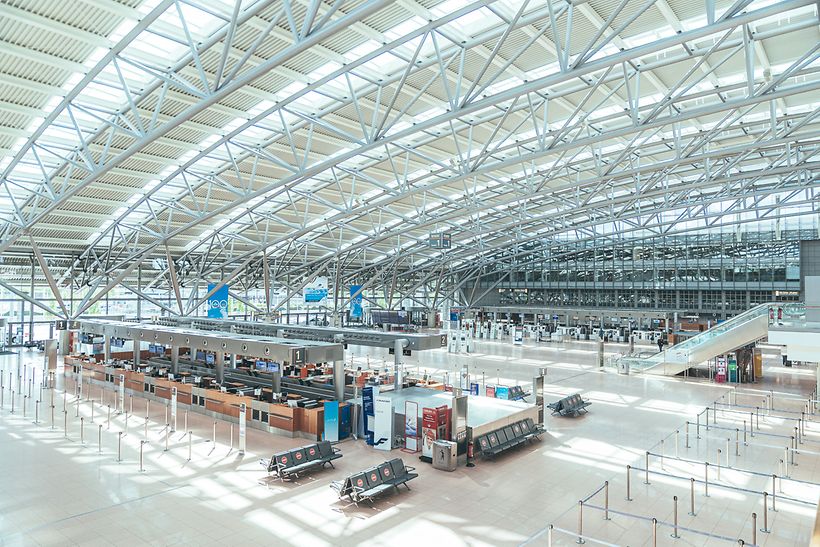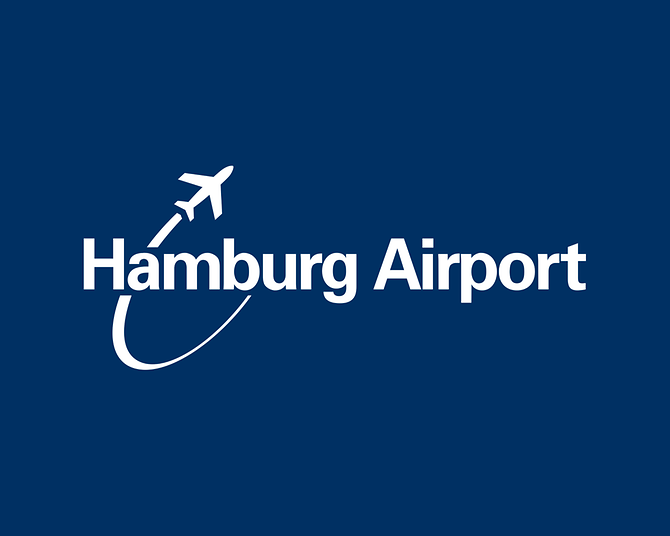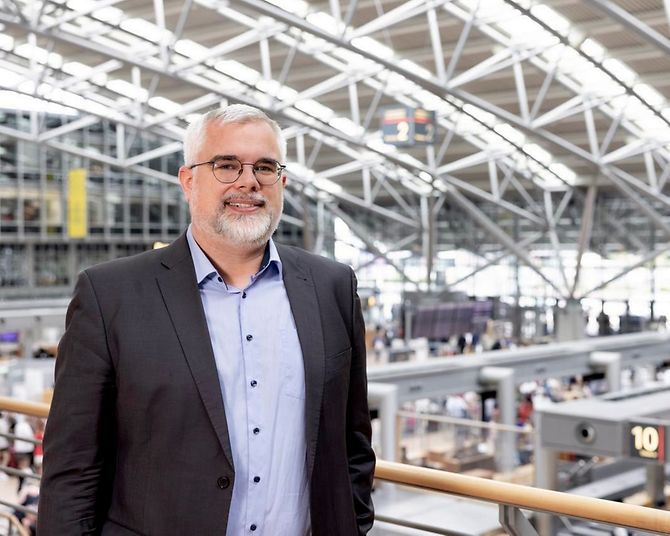Hamburg Airport takes stock: 2020, the coronavirus year, results in first negative result in at least 25 years
Strict savings programme: Costs reduced to minimum / Hopes high for summer business / Sights set on climate protection targets: CO2 neutrality from the end of 2021
29.03.2021
The effects of the coronavirus pandemic have left deep scars in Hamburg Airport’s balance sheet. This unprecedented crisis has resulted in a first-ever deficit of 113 million euros. Without a strict savings programme, the annual result would have been even worse. Hamburg’s passenger volume alone collapsed by 73.7% from the previous year’s figures. Hopes are now high for the 2021 summer market. Despite the crisis, the airport’s sights are still firmly set on its climate protection targets. By the end of 2021, the company wants to achieve CO2-neutral operations.
“Aviation has effectively been in a lockdown for one year now,” explains Michael Eggenschwiler, CEO of Hamburg Airport. “This has naturally left its mark on our balance sheet. For at least the last 25 years, Hamburg Airport has always been profitable. Our profits over the past quarter of a century have enabled us to transfer around 900 million euros to our shareholders. For the first time ever, we find ourselves presenting a negative result. This is a bitter blow. Travel restrictions led for a time to an almost complete shutdown of air travel. We put on the brakes and reduced all costs to an absolute minimum. In a concerted effort, we as a company have dealt with this crisis responsibly.”
Dramatic collapse in earnings from traffic and rent
For the first time ever, Hamburg Airport concluded the 2020 financial year with a loss of 113 million euros. As a result of the strict savings programme, the deficit was thus 13 percent less than originally anticipated. Turnover for the year, at just under 119.6 million euros, was 56.5 percent lower than in 2019 (274.8 million euros). This is particularly attributable to the dramatic collapse in earning from traffic and from the turnover-based rent of shops and restaurants.
The airport’s investment volume in 2020 amounted to 52.7 million euros (2019: 115.9 million euros). The largest investment projects were the completion of Apron 1 (2020: 19.6 million euros) and the renewal of the baggage conveyor system (2020: 6.7 million euros). Planned investments such as the rear side of the southern passenger pier and the completion of the shuttle gates were stopped. The balance sheet total rose by 15 percent to 848.8 million euros (2019: 738.2 million euros). This is a result of the taking out of loans to cover ongoing costs. Liquidity was, however, guaranteed at all times, as is also the case in the outlook for 2021.
Only 26.3 percent of 2019’s passengers
The coronavirus pandemic brought operations to a standstill for a period. Only 4.56 million passengers used the airport, just 26.3 percent of the number from the previous year. Such a devastating decline in passenger figures has never been seen before in the history of Hamburg Airport. With around 66,300 take-offs and landings, the number of aircraft movements declined by 56.8 percent in 2020, compared to the previous year (2019: 155,200 flights). In terms of commercial flights, encompassing primarily scheduled and charter traffic, the decline was even stronger: the number of take-offs and landings sank by 63 percent, from 140,800 flights in 2019 to around 52,100 in 2020. The one bright spot during this crisis remains cargo, with air transport ensuring medical supplies, for example.
Costs pared back to a minimum: Short-time work and decommissioning
Hamburg Airport acted responsibly in this challenging crisis, reducing all costs to an absolute minimum. The airport had to remain open throughout the year, for example for the transportation of people suffering from Covid-19 and of medical products, despite extensive losses. Some infrastructure was taken out of service, and Terminal 2 and several car parks were closed for months. The airport was also one of the first companies to implement short-time work in March 2020, securing jobs; this measure will continue through the entirety of 2021. Investment projects were largely stopped or postponed. For 2021, Hamburg Airport is currently anticipating a deficit of approximately 90 million euros. Possible federal grants have not been taken into account in these figures. At the end of 2020, Hamburg Airport was still assuming that around 43 percent of 2019 passenger levels could be achieved in 2021, equating to some 8.5 million passengers. The present lengthy lockdown and stricter travel restrictions, however, indicate that this forecast will not be achievable. Hamburg Airport is currently expecting 7.5 million passengers for 2021.
Prognosis for 2021: hopes rest on summer business
“The airlines will already significantly expand their service offerings at Easter. But our great hope is resting on the summer business,” says Michael Eggenschwiler. “I am convinced that the combination of tests and vaccinations will mean that summer vacation flights are possible again. It must be made much simpler for passengers, though, and a digital EU vaccine passport is the right approach.” Testing capacities at the airport will increase significantly from 1 April 2021 with an additional service provider and a drive-through test station.
Airlines slowly expanding flight operations
There is a great desire to travel, with a lot of catching up to do in terms of private and vacation flights. Hamburg Airport is getting ready to welcome more passengers at the airport again, and will be reactivating its own infrastructure step-by-step. In summer, residents of northern Germany will once again have more choice, with 105 destinations on offer. This will also include brand new routes. WizzAir, for example, has announced flights to Belgrade, Tirana and Cluj starting in the summer. Larnaca, Samos, Chania, Kalamata, Chișinău and Preveza are also new additions to the airport’s route network.
There will also be three new airlines operating from Hamburg Airport. From April, Nordwind will be flying regularly to Moscow, Sky Up will be operating a twice weekly service to Kiev, and DAT will be flying to Saarbrücken three times a week. Hamburg Airport is also engaged in promising discussions with many other airlines. At present, a total of around 45 airlines are expected to be flying from Hamburg to approximately 105 destinations this summer.
Our climate protection target: CO2-neutral from the end of 2021
Despite the crisis, Hamburg Airport is pursuing its climate protection goals as a top priority. From the end of 2021, we aim to have fully CO2-neutral operations, making us the first airport in Germany to achieve level 3+ certification with Airport Carbon
Accreditation. Airport Carbon Accreditation is an independent certification system from the ACI Europe airports association, independently evaluating and recognising airports for their efforts to manage and reduce CO₂ emissions. The building blocks of CO2-neutral airport operations are: reduced energy consumption, innovative technologies, alternative power for surface vehicles, conservation projects, and high quality offset certificates. Our declared goal is to reduce the proportion of offset certificates purchased, step-by-step, as soon as additional CO2 reductions can be achieved by our own actions. The scope of measures that can be implemented depends on the airport’s financial situation. Almost 100 percent of the vehicle fleet has already been converted to alternative engines and fuels (incl. synthetic diesel).
Contact persons for journalists / media
-
Telefon:
+49 (0)40 5075 3611E-Mail:
presse@ham.airport.de -
Telefon:
+49 (0)40 5075 3615E-Mail:
kbromm@ham.airport.de -
Telefon:
+49 (0)40 5075 3680E-Mail:
jniemeyer@ham.airport.de -
Telefon:
+49 (0)40 5075 3671E-Mail:
pwolf@ham.airport.de






